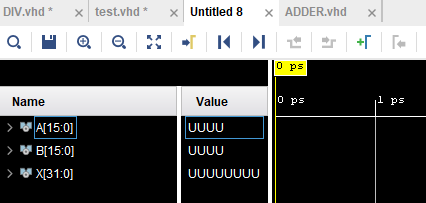I'm creating an ALU for a simple calculator. I have made the addition, subtraction, and multiplication part of the ALU and with them I didn't have to initialize anything.
I am attempting to create the division part but my inputs and outputs will not initialize. I have tried setting the ports to 0 but still they remain uninitialized (it reports "UUUU" or "UUUUUUUU").
The problem seems to be in this line:
X <=std_logic_vector(to_unsigned(to_integer(unsigned(A))/to_integer(unsigned(B)),32));
Source:
library IEEE;
use IEEE.STD_LOGIC_1164.ALL;
use ieee.std_logic_unsigned.all;
use ieee.numeric_std.all;
entity DIV is
port(
A: in std_logic_vector(15 downto 0);
B: in std_logic_vector(15 downto 0);
X: out std_logic_vector(31 downto 0)
);
end DIV;
architecture Behavioral of DIV is
begin
X <=std_logic_vector(to_unsigned(to_integer(unsigned(A))/to_integer(unsigned(B)),32));
end Behavioral;
Testbench:
library IEEE;
use IEEE.Std_logic_1164.all;
use IEEE.Numeric_Std.all;
entity DIV_tb is
end;
architecture bench of DIV_tb is
component DIV
port(
A: in std_logic_vector(15 downto 0);
B: in std_logic_vector(15 downto 0);
X: out std_logic_vector(31 downto 0)
);
end component;
signal A: std_logic_vector(15 downto 0);
signal B: std_logic_vector(15 downto 0);
signal X: std_logic_vector(31 downto 0);
begin
uut: DIV port map ( A => A,
B => B,
X => X );
stimulus: process
begin
A<= std_logic_vector(to_unsigned(integer(12), 16));
B<= std_logic_vector(to_unsigned(integer(6), 16));
wait for 1ns;
if X =std_logic_vector(to_unsigned(integer(2), 32)) then report "PASS for division of A = 12, B = 6";
else report "FAIL for division of A = 12, B = 6";
end if;
A<= std_logic_vector(to_unsigned(integer(300), 16));
B<= std_logic_vector(to_unsigned(integer(7), 16));
wait for 1ns;
if X =std_logic_vector(to_unsigned(integer(42), 32)) then report "PASS for division of A = 300, B = 7";
else report "FAIL for division of A = 300, B = 7";
end if;
A<= std_logic_vector(to_unsigned(integer(500), 16));
B<= std_logic_vector(to_unsigned(integer(6), 16));
wait for 1ns;
if X =std_logic_vector(to_unsigned(integer(83), 32)) then report "PASS for division of A = 500, B = 6";
else report "FAIL for division of A = 500, B = 6";
end if;
A<= std_logic_vector(to_unsigned(integer(755), 16));
B<= std_logic_vector(to_unsigned(integer(7), 16));
wait for 1ns;
if X =std_logic_vector(to_unsigned(integer(107), 32)) then report "PASS for division of A = 755, B = 7";
else report "FAIL for division of A = 755, B = 7";
end if;
A<= std_logic_vector(to_unsigned(integer(500), 16));
B<= std_logic_vector(to_unsigned(integer(14), 16));
wait for 1ns;
if X =std_logic_vector(to_unsigned(integer(35), 32)) then report "PASS for division of A = 500, B = 14";
else report "FAIL for division of A = 500, B = 14";
end if;
A<= std_logic_vector(to_unsigned(integer(222), 16));
B<= std_logic_vector(to_unsigned(integer(11), 16));
wait for 1ns;
if X =std_logic_vector(to_unsigned(integer(20), 32)) then report "PASS for division of A = 222, B = 11";
else report "FAIL for division of A = 222, B = 11";
end if;
A<= std_logic_vector(to_unsigned(integer(18), 16));
B<= std_logic_vector(to_unsigned(integer(6), 16));
wait for 1ns;
if X =std_logic_vector(to_unsigned(integer(3), 32)) then report "PASS for division of A = 18, B = 6";
else report "FAIL for division of A = 18, B = 6";
end if;
A<= std_logic_vector(to_unsigned(integer(999), 16));
B<= std_logic_vector(to_unsigned(integer(8), 16));
wait for 1ns;
if X =std_logic_vector(to_unsigned(integer(124), 32)) then report "PASS for division of A = 999, B = 8";
else report "FAIL for division of A = 999, B = 8";
end if;
end process;
end;
This an image of the wave forms:

